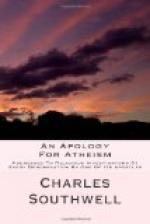Nor are avarice and lust of power the only base passions under the influence of which men, great in intellect, have given the lie to their own convictions, by calling that religion which they knew to be rank superstition. Fear of punishment for writing truth is the grand cause why their books contain so little of it. If Bacon had openly treated Christianity as mere superstition, will any one say that his life would have been worth twenty-four hours purchase. He lived at a time when heresy, to say nothing of Atheism, was rewarded with death. Bacon was not the man to be ambitious of such a reward. Few great geniuses are. Philosophers seldom covet martyrdom, and hence it came to pass that few of them would run the terrible risk of provoking bigotted authority by the ‘truth, the whole truth, and nothing but the truth’ concerning religion. In our own day the smell of a faggot would be too much for the nostrils of, that still unamiable but somewhat improved animal, called the public. One delightful as well as natural consequence is, that philosophical writers do ever and anon deal much more freely with religion than its professors are disposed, though compelled, to tolerate. But, even now, with all our boasted liberty of conscience, not one in one thousand of those who think truth about religion dare express it. Philosophy still exhibits, in deference to popular prejudice and fanaticism, what the great French maximist defined as ’the homage that vice pays to virtue.’ Such is the rule to which, most fortunately for the pause of truth, there are many, and some splendid, exceptions. One of these is worth citing not only because of its intrinsic merit, but because the thing to be cited includes an opinion of religion, and a marked distinction between what is pious and what is honest, that calls for especial notice. The exception referred to is a paragraph from a paper on Saint Simonianism, written by Colonel Thompson, and originally published in the Westminster Review, of April 1, 1832, containing these remarkable words:—’The world wants honest law-givers, not pious ones. If piety will make men honest, let them favour us with the honesty and keep the piety for God and their own consciences. There never was a man that brought piety upon the board when honesty would do, without its being possible to trace a transfusion in the shape of money or money’s worth, from his neighbour’s pocket into his. The object of puzzling the question with religion is clear. You cannot quarrel for sixpences with the man who is helping you the way to heaven. The man who wants your sixpences, therefore, assumes a religious phraseology, which is cant, and cant is fraud, and fraud is dishonesty, and the dishonest should have a mark set on them.’
There is an old story about a certain lady who said to her physician, ‘Doctor, what is your religion?’ ‘My religion, madam,’ replied the Doctor, ‘is the religion of all sensible men.’ ’What kind of religion is that?’ said the lady. ‘The religion, madam,’ quoth the Doctor, ’that no sensible man will tell.’




